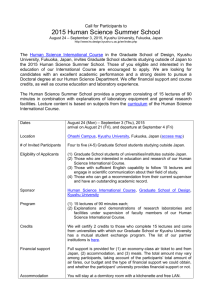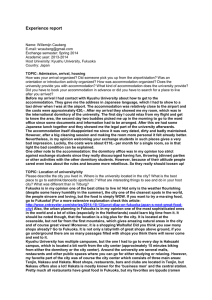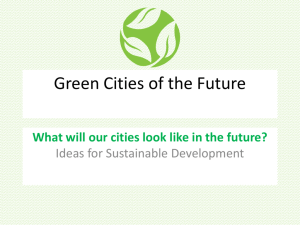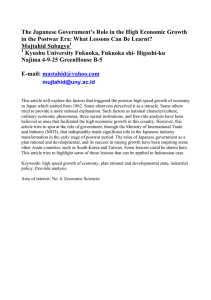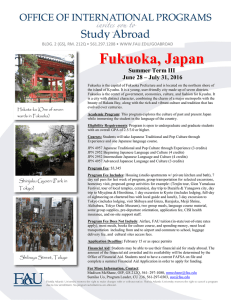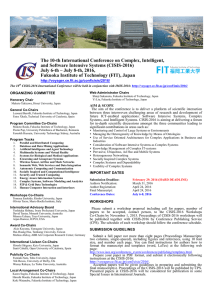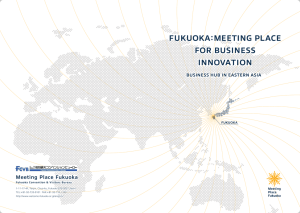Fukuoka City
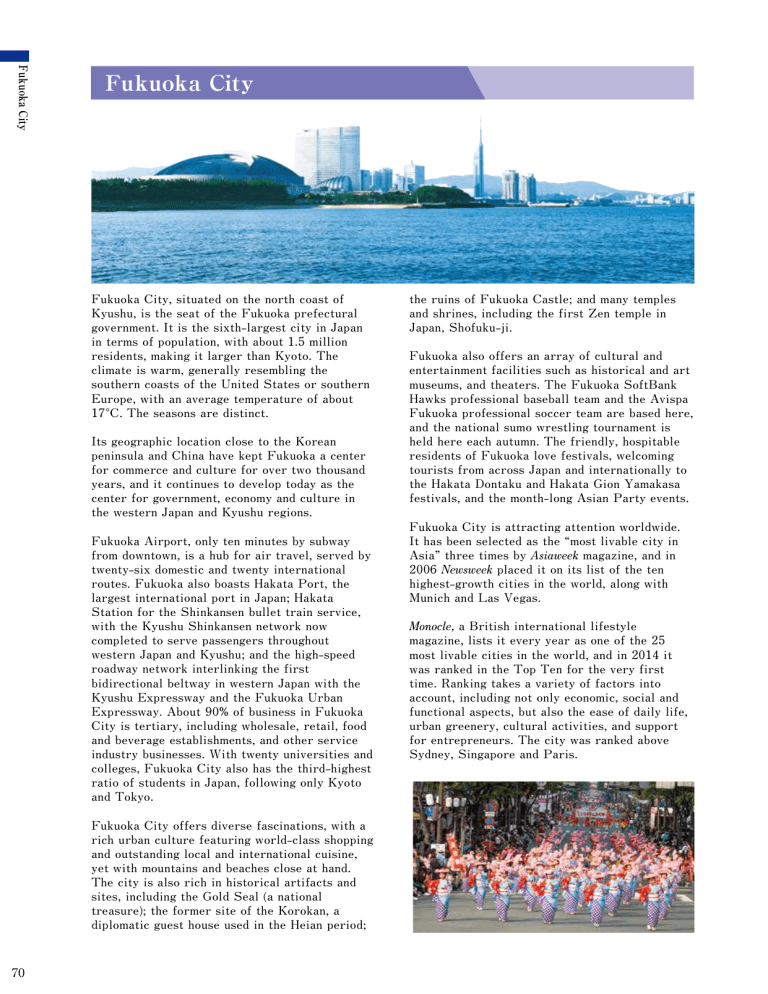
Fukuoka City
70
Fukuoka City, situated on the north coast of
Kyushu, is the seat of the Fukuoka prefectural government. It is the sixth-largest city in Japan in terms of population, with about 1.5 million residents, making it larger than Kyoto. The climate is warm, generally resembling the southern coasts of the United States or southern
Europe, with an average temperature of about
17°C. The seasons are distinct.
Its geographic location close to the Korean peninsula and China have kept Fukuoka a center for commerce and culture for over two thousand years, and it continues to develop today as the center for government, economy and culture in the western Japan and Kyushu regions.
Fukuoka Airport, only ten minutes by subway from downtown, is a hub for air travel, served by twenty-six domestic and twenty international routes. Fukuoka also boasts Hakata Port, the largest international port in Japan; Hakata
Station for the Shinkansen bullet train service, with the Kyushu Shinkansen network now completed to serve passengers throughout western Japan and Kyushu; and the high-speed roadway network interlinking the first bidirectional beltway in western Japan with the
Kyushu Expressway and the Fukuoka Urban
Expressway. About 90% of business in Fukuoka
City is tertiary, including wholesale, retail, food and beverage establishments, and other service industry businesses. With twenty universities and colleges, Fukuoka City also has the third-highest ratio of students in Japan, following only Kyoto and Tokyo.
Fukuoka City offers diverse fascinations, with a rich urban culture featuring world-class shopping and outstanding local and international cuisine, yet with mountains and beaches close at hand.
The city is also rich in historical artifacts and sites, including the Gold Seal (a national treasure); the former site of the Korokan, a diplomatic guest house used in the Heian period; the ruins of Fukuoka Castle; and many temples and shrines, including the first Zen temple in
Japan, Shofuku-ji.
Fukuoka also offers an array of cultural and entertainment facilities such as historical and art museums, and theaters. The Fukuoka SoftBank
Hawks professional baseball team and the Avispa
Fukuoka professional soccer team are based here, and the national sumo wrestling tournament is held here each autumn. The friendly, hospitable residents of Fukuoka love festivals, welcoming tourists from across Japan and internationally to the Hakata Dontaku and Hakata Gion Yamakasa festivals, and the month-long Asian Party events.
Fukuoka City is attracting attention worldwide.
It has been selected as the “most livable city in
Asia” three times by Asiaweek magazine, and in
2006 Newsweek placed it on its list of the ten highest-growth cities in the world, along with
Munich and Las Vegas.
Monocle, a British international lifestyle magazine, lists it every year as one of the 25 most livable cities in the world, and in 2014 it was ranked in the Top Ten for the very first time. Ranking takes a variety of factors into account, including not only economic, social and functional aspects, but also the ease of daily life, urban greenery, cultural activities, and support for entrepreneurs. The city was ranked above
Sydney, Singapore and Paris.
Access
Map
Harbin
Kathmandu
Dhaka
5,000 km
Yangon
Beijing
Dalian
Hong Kong
Seoul
Nanjing
FUKUOKA
Shanghai
1,000 km
Taipei
Hanoi
Manila
2,000 km
Bangkok
Kuala Lumpur
Singapore
Tokyo
Fukuoka
Saga
Nagasaki
Kumamoto
Oita
Miyazaki
Kagoshima
To Kitakyushu
JR Railway Lines
Shinkansen Lines
Private Railway Lines
Subway Lines
Fukuoka Expressway
Meinohama
JR Chikuhi Line
To Karatsu
Fukushige Junction
Hakata Bay
Fukuoka Expressway Kashii Route
Wakaba High School
Tenjin-kita Ramp
Momochi Ramp
Nishijin
Subway Kuko Line Tenjin
Tojin-machi
Ropponmatsu
Yakuin
Ohori High School
Ohori Junior High School
Fukuoka
University
Tenjin
Omuta Line
Hashimoto
N
Noke Ramp
Fukuoka Univerisity
Hospital
Fukuoka Expressway Circular Route
Tsutsumi Ramp
Kuko Ramp
JR Sasaguri Line
Fukuoka Airport
Tsukiguma Junction
JR Kagoshima Line
Tempaizan
Asakura
Gaido
Fukuoka University
Chikushi Hospital
5 min.
Kuko Line
6 min.
8 min. walk for transfer
Nanakuma Line
16 min.
Subway
Car or Taxi
Note: The times given above are estimates.
Please note that heavy traffic during certain hours may increase travel time.
30 min. by car or taxi
45 min. by car or taxi
71

